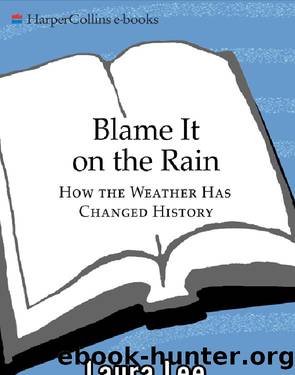Blame It on the Rain by Laura Lee

Author:Laura Lee [Laura Lee]
Language: eng
Format: epub
ISBN: 9780061739378
Publisher: HarperCollins
Published: 2006-06-14T16:00:00+00:00
The Water of Waterloo
If it had not rained on the night of June 17, 1815, the future of Europe would have been changed…. A few drops of rain mastered Napoleon. Because Waterloo was the finale of Austerlitz, Providence needed only a cloud crossing the sky out of season to cause the collapse of a world.
—Victor Hugo, Les Misérables.
If you visit the site of the Battle of Waterloo today you will find pictures of Napoleon, Napoleon souvenirs, mentions everywhere of Napoleon. You’d be forgiven for forgetting that the victory went to the Duke of Wellington, whose name is much less prominent. Waterloo was not the battle that made Wellington; it was the battle that unmade the emperor.
There were many reasons for this loss, one of which was the weather. Rain showers on the night of June 17, 1815, softened the ground. This meant the French had to delay the morning’s fighting until about 11:30, which allowed time for the Prussians to join the fray.
Early in 1814, Napoleon had been forced to abdicate and he was banished into exile on the island of Elba, off the coast of Italy. Apparently viewing the past fifty years or so as a failed experiment, the French Senate reinstated the Bourbon dynasty. Louis XVI’s brother became king. Thing is, the French people were not any more enamored of the idea of having a king than they had been before the revolution. Those who remained loyal to Napoleon wrote to him and asked him to come back, which he did on March 20, 1815, and began what came to be known as his “one hundred days’ rule.”
While he was cheered by crowds in Paris, his return was not nearly as welcome in the rest of Europe. Sir James Mackintosh summed up the English view when he said: “Was it in the power of language to describe the evil? Wars which had raged for more than twenty years in Europe; which had spread blood and desolation from Cádiz to Moscow, and from Naples to Copenhagen; which had wasted the means of human enjoyment, and destroyed the instruments of social improvement…the work of our fortitude is undone; the blood of Europe is spilled in vain.”
All of the powers of Europe united against this threat: Great Britain, Prussia, Austria, and Russia started planning for an invasion of France. Napoleon was well aware that it was coming and in less than a month, he had prepared a force of one hundred and twenty-five thousand men of his own. The allies, meanwhile, had assembled two armies in Belgium. The Prussians had one hundred and sixteen thousand men under the command of Field Marshal Blücher. The Duke of Wellington commanded a mixed force made up of British, Belgians, Dutch, and Germans, which numbered about ninety-three thousand. The Austrians and Russians were to join them in July, and a force of six hundred thousand would march into France.
Napoleon had no intention of waiting, and he led his army to Waterloo. Two corps of the
Download
This site does not store any files on its server. We only index and link to content provided by other sites. Please contact the content providers to delete copyright contents if any and email us, we'll remove relevant links or contents immediately.
How to Do Nothing by Jenny Odell(3289)
A Forest Journey by John Perlin(3062)
The Plant Messiah by Carlos Magdalena(2918)
Babylon's Ark by Lawrence Anthony(2666)
The ESV Study Bible by Crossway Bibles(2543)
Energy Myths and Realities by Vaclav Smil(2480)
Fatal Storm by Rob Mundle(2207)
Abbey in America by Murray John A(2075)
Witness Tree by Lynda V. Mapes(1912)
Brokeback Mountain by Annie Proulx(1827)
Client Earth by James Thornton(1768)
Shadows on the Gulf by Rowan Jacobsen(1736)
Cosmos by Carl Sagan(1712)
Coming Back to Life by Joanna Macy(1707)
Water Rights and the Environment in the United States by John Burch(1673)
Mycelium Running: How Mushrooms Can Help Save the World by Paul Stamets(1670)
Ten Billion by Stephen Emmott(1646)
The overachievers by Robbins Alexandra(1573)
Ecological Intelligence by Daniel Goleman(1569)
